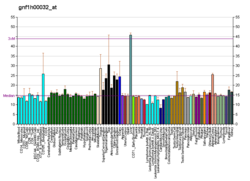ADH4
Alcohol dehydrogenase 4 is an enzyme that in humans is encoded by the ADH4 gene.[5]
This gene encodes class II alcohol dehydrogenase 4 pi subunit, which is a member of the alcohol dehydrogenase family. Members of this enzyme family metabolize a wide variety of substrates, including ethanol, retinol, other aliphatic alcohols, hydroxysteroids, and lipid peroxidation products. Class II alcohol dehydrogenase is a homodimer composed of 2 pi subunits. It exhibits a high activity for oxidation of long-chain aliphatic alcohols and aromatic alcohols and is less sensitive to pyrazole. This gene is localized to chromosome 4 in the cluster of alcohol dehydrogenase genes.[5]
There is evidence that ancestors of modern humans developed the ADH4 producing gene some 10 million years ago. This probably helped them to take advantage of rotting fruit as they shifted to a terrestrial lifestyle.[6]
References
[edit]- ^ a b c GRCh38: Ensembl release 89: ENSG00000198099 – Ensembl, May 2017
- ^ a b c GRCm38: Ensembl release 89: ENSMUSG00000037797 – Ensembl, May 2017
- ^ "Human PubMed Reference:". National Center for Biotechnology Information, U.S. National Library of Medicine.
- ^ "Mouse PubMed Reference:". National Center for Biotechnology Information, U.S. National Library of Medicine.
- ^ a b "Entrez Gene: ADH4 alcohol dehydrogenase 4 (class II), pi polypeptide".
- ^ Choi CQ (Dec 2, 2014). "Origins of Human Alcohol Consumption Revealed". Scientific American. Retrieved 18 May 2023.
Further reading
[edit]- Jörnvall H (1994). "The alcohol dehydrogenase system". Toward a Molecular Basis of Alcohol Use and Abuse. Vol. 71. pp. 221–9. doi:10.1007/978-3-0348-7330-7_22. ISBN 978-3-0348-7332-1. PMID 8032153.
{{cite book}}:|journal=ignored (help) - Edman K, Maret W (1993). "Alcohol dehydrogenase genes: restriction fragment length polymorphisms for ADH4 (pi-ADH) and ADH5 (chi-ADH) and construction of haplotypes among different ADH classes". Hum. Genet. 90 (4): 395–401. doi:10.1007/bf00220466. PMID 1362387. S2CID 30770835.
- von Bahr-Lindström H, Jörnvall H, Höög JO (1991). "Cloning and characterization of the human ADH4 gene". Gene. 103 (2): 269–74. doi:10.1016/0378-1119(91)90285-J. PMID 1889753.
- Höög JO, von Bahr-Lindström H, Hedén LO, et al. (1987). "Structure of the class II enzyme of human liver alcohol dehydrogenase: combined cDNA and protein sequence determination of the pi subunit". Biochemistry. 26 (7): 1926–32. doi:10.1021/bi00381a021. PMID 3036213.
- Mårdh G, Dingley AL, Auld DS, Vallee BL (1987). "Human class II (pi) alcohol dehydrogenase has a redox-specific function in norepinephrine metabolism". Proc. Natl. Acad. Sci. U.S.A. 83 (23): 8908–12. doi:10.1073/pnas.83.23.8908. PMC 387042. PMID 3466164.
- Li M, Edenberg HJ (1998). "Function of cis-acting elements in human alcohol dehydrogenase 4 (ADH4) promoter and role of C/EBP proteins in gene expression". DNA Cell Biol. 17 (4): 387–97. doi:10.1089/dna.1998.17.387. PMID 9570155.
- Tryggvason K, Romert A, Eriksson U (2001). "Biosynthesis of 9-cis-retinoic acid in vivo. The roles of different retinol dehydrogenases and a structure-activity analysis of microsomal retinol dehydrogenases". J. Biol. Chem. 276 (22): 19253–8. doi:10.1074/jbc.M100215200. PMID 11279029.
- Xu XR, Huang J, Xu ZG, et al. (2002). "Insight into hepatocellular carcinogenesis at transcriptome level by comparing gene expression profiles of hepatocellular carcinoma with those of corresponding noncancerous liver". Proc. Natl. Acad. Sci. U.S.A. 98 (26): 15089–94. Bibcode:2001PNAS...9815089X. doi:10.1073/pnas.241522398. PMC 64988. PMID 11752456.
- Iida A, Saito S, Sekine A, et al. (2002). "Thirteen single-nucleotide polymorphisms (SNPs) in the alcohol dehydrogenase 4 (ADH4) gene locus". J. Hum. Genet. 47 (2): 74–6. doi:10.1007/s100380200003. PMID 11916005.
- Strömberg P, Svensson S, Hedberg JJ, et al. (2002). "Identification and characterisation of two allelic forms of human alcohol dehydrogenase 2". Cell. Mol. Life Sci. 59 (3): 552–9. doi:10.1007/s00018-002-8447-1. PMC 11337534. PMID 11964133. S2CID 21451213.
- Chou CF, Lai CL, Chang YC, et al. (2002). "Kinetic mechanism of human class IV alcohol dehydrogenase functioning as retinol dehydrogenase". J. Biol. Chem. 277 (28): 25209–16. doi:10.1074/jbc.M201947200. PMID 11997393.
- Strausberg RL, Feingold EA, Grouse LH, et al. (2003). "Generation and initial analysis of more than 15,000 full-length human and mouse cDNA sequences". Proc. Natl. Acad. Sci. U.S.A. 99 (26): 16899–903. Bibcode:2002PNAS...9916899M. doi:10.1073/pnas.242603899. PMC 139241. PMID 12477932.
- Galter D, Carmine A, Buervenich S, et al. (2003). "Distribution of class I, III and IV alcohol dehydrogenase mRNAs in the adult rat, mouse and human brain". Eur. J. Biochem. 270 (6): 1316–26. doi:10.1046/j.1432-1033.2003.03502.x. PMID 12631290.
- Neumark YD, Friedlander Y, Durst R, et al. (2004). "Alcohol dehydrogenase polymorphisms influence alcohol-elimination rates in a male Jewish population". Alcohol. Clin. Exp. Res. 28 (1): 10–4. doi:10.1097/01.ALC.0000108667.79219.4D. PMID 14745297.
- Gerhard DS, Wagner L, Feingold EA, et al. (2004). "The status, quality, and expansion of the NIH full-length cDNA project: the Mammalian Gene Collection (MGC)". Genome Res. 14 (10B): 2121–7. doi:10.1101/gr.2596504. PMC 528928. PMID 15489334.
- Luo X, Kranzler HR, Zuo L, et al. (2006). "ADH4 gene variation is associated with alcohol and drug dependence: results from family controlled and population-structured association studies". Pharmacogenet. Genomics. 15 (11): 755–68. doi:10.1097/01.fpc.0000180141.77036.dc. PMID 16220108. S2CID 38408639.
- Luo X, Kranzler HR, Zuo L, et al. (2006). "ADH4 gene variation is associated with alcohol dependence and drug dependence in European Americans: results from HWD tests and case-control association studies". Neuropsychopharmacology. 31 (5): 1085–95. doi:10.1038/sj.npp.1300925. PMID 16237392.
- Luo X, Kranzler HR, Zuo L, et al. (2007). "Personality traits of agreeableness and extraversion are associated with ADH4 variation". Biol. Psychiatry. 61 (5): 599–608. doi:10.1016/j.biopsych.2006.05.017. PMC 1853245. PMID 17069770.
- Carrigana MA, Uryasev O, et al. (2014). "Hominids adapted to metabolize ethanol long before human-directed fermentation". Proc. Natl. Acad. Sci. USA. 112 (2): 599–608. doi:10.1073/pnas.1404167111. PMC 4299227. PMID 25453080.
External links
[edit]- Human ADH4 genome location and ADH4 gene details page in the UCSC Genome Browser.






